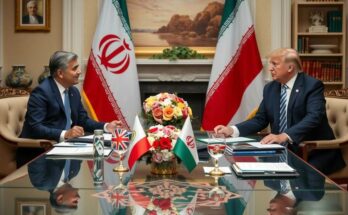At Cop29, concerns have been raised about the summit’s effectiveness due to its hosting by fossil fuel-rich Azerbaijan. Experts, including Professor Johan Rockström, call for a major overhaul of the conference format, criticizing its shift towards legitimizing fossil fuel interests instead of addressing climate change. There is widespread disappointment over the minimal progress made in climate commitments since the Paris Agreement, with increasing fears about the potential repercussions of inaction.
As discussions at Cop29 progress, Professor Johan Rockström, among notable experts, expresses skepticism regarding the summit’s effectiveness. He, alongside other distinguished individuals like former UN Secretary General Ban Ki-moon, advocates for a significant restructuring of the Cop conferences, which have pivoted towards fossil fuel interests, particularly in petrostates. Observations from Azerbaijan’s leadership, including President Ilham Aliyev’s reverential comments on natural gas, highlight a troubling contradiction to the summit’s climate objectives. It is concerning that high-ranking officials openly discussed leveraging Cop negotiations for oil deals, undermining the fundamental purpose of the climate talks. While the dominant role of fossil fuels is undeniable, it raises questions about the appropriateness of hosting countries like Azerbaijan, which has a deep-rooted oil industry history. Last year’s Cop28 faced similar criticisms while hosted by the oil-rich United Arab Emirates. The narrative of conferences becoming mere platforms for fossil fuel negotiations is echoed in Rockström’s critique of participants’ intentions and actions. Rockström insists that the current format of Cop meetings has devolved into a spectacle devoid of substantive change, marked by a lack of engagement in transformative actions evident in their soaring attendance surpassing crucial climate discussions. Rockström argues for maintaining dialogue with oil-producing nations, yet he underscores the urgent need for reform within the Cop structure to align with the scientific consensus on climate action. He recalls the pivotal agreements forged under the auspices of earlier Cop meetings, notably the Paris Agreement, and emphasizes that the commitment to limit global warming to 1.5°C is now under severe threat. The failure to execute the necessary transitions over nearly three decades has compounded the climate crisis. He warns that without radical changes in approach and action, aspirations for climate adequacy may remain unfulfilled as countries continue to languish in limited, incremental progress. Cop meetings must not perpetuate an illusion of action; rather, they must yield genuine commitment and accountability for emissions management. To restore credibility, Rockström argues for a more streamlined, purposeful conference environment and a reassessment of host nations to avoid conflicts of interest. Ultimately, Rockström’s outlook for Cop29 is waning, asserting, “I have very low expectations.” The path ahead necessitates swift, decisive action to fulfill the climate commitments made for the benefit of global sustainability.
The text addresses the critical perspective of Professor Johan Rockström and other climate experts regarding the effectiveness and integrity of the Cop29 climate conference, particularly highlighting concerns about its leadership and discussions centered around fossil fuel interests. The backdrop of this critique is the historical context of climate summits, which were conceived to foster global climate action but are now seen as lacking effectiveness, especially when hosted by nations heavily invested in fossil fuel industries. This discussion underscores the urgent need for transformative changes in strategy and approach within these critical international negotiations.
In summary, the discourse surrounding Cop29 reveals profound dissatisfaction with the conference’s direction and effectiveness. Experts like Professor Johan Rockström advocate for a transformative overhaul to ensure that future climate summits can meaningfully address the urgent crisis. The ongoing conflicts of interest presented by fossil fuel-dependent host nations and a significant proportion of lobbyists in attendance raise serious questions about the accountability and integrity of these international meetings.
Original Source: www.telegraph.co.uk




